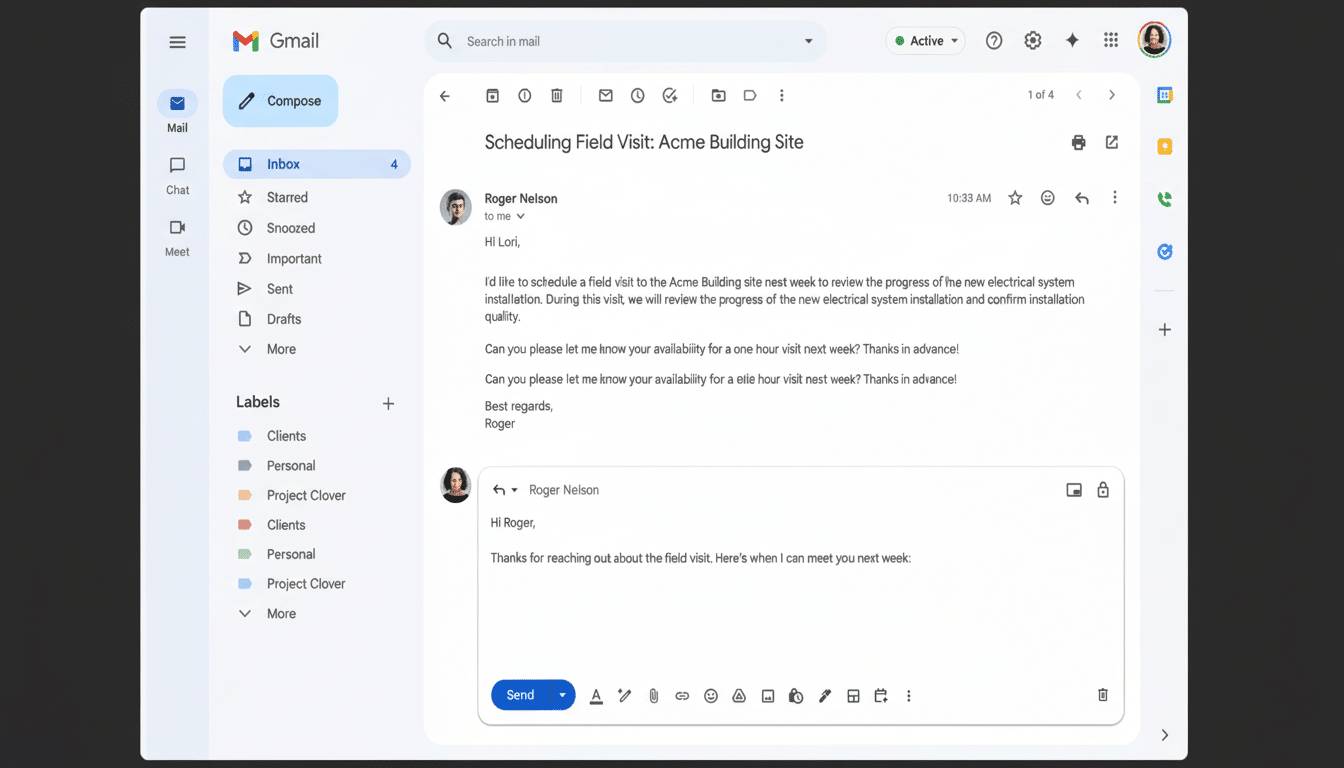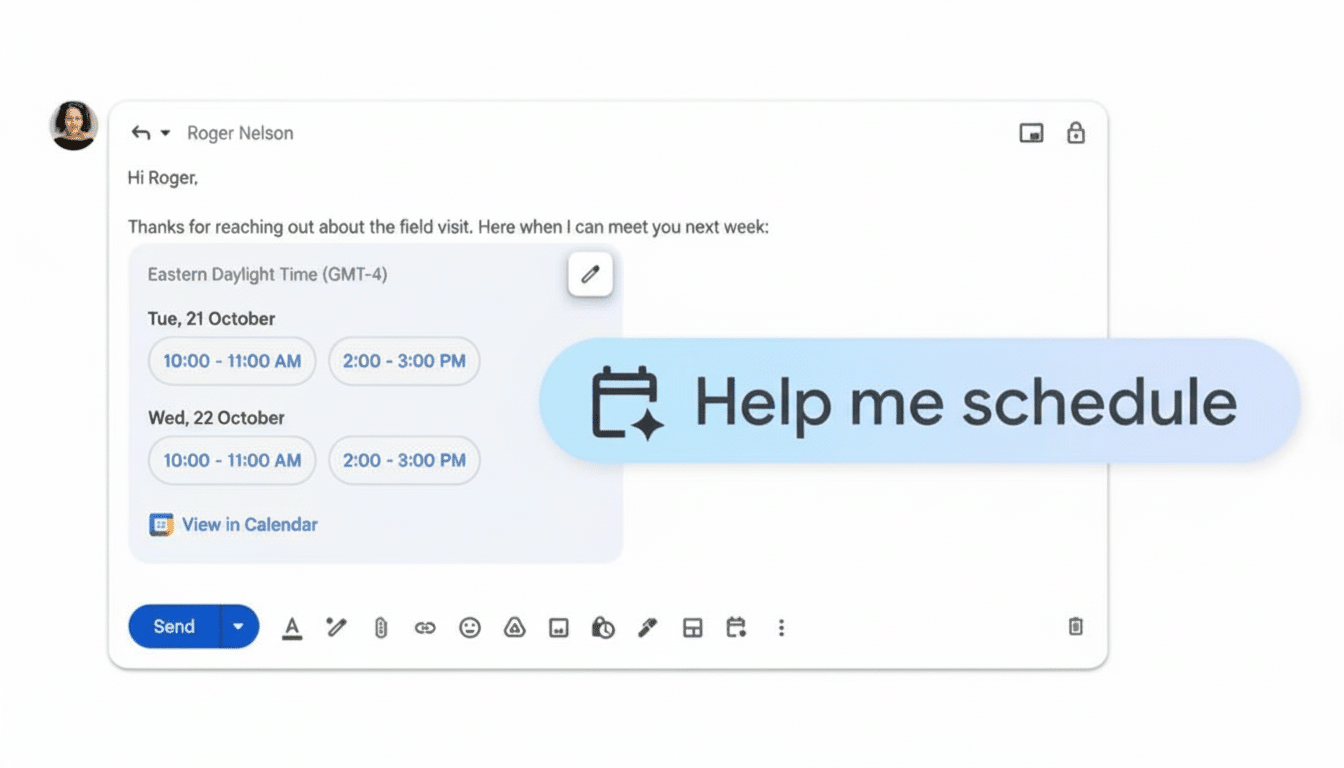Google is launching a new Help Me Schedule feature powered by Gemini in Gmail and Calendar, which aims to eliminate the back-and-forth that meeting planning tends to be fraught with. It’s reading the context of your email draft, checking your Google Calendar availability, and suggesting times you can meet, all within an email message.
How Help Me Schedule Works in Gmail and Calendar
When Gmail senses that you’re attempting to schedule a meeting, it shows a Help Me Schedule button next to your compose tools. Tap that, and Gemini scours the exchange for signals — duration time, favorite days of the week, even snippets like “next week” or “later in the afternoon” — which it then cross-references with your calendar to generate a list of possible times.

For example, assume a contact says they’re free for 30 minutes next week. The tool will present half-hour slots within that window which work with your availability. You can modify the time frame, duration, or location and then insert the proposed times into your response. When the other person chooses a slot, the event is generated and added to both calendars — saving what used to be an aggravating back-and-forth of emails.
At launch, Help Me Schedule is one-on-one coordination. It’s not (as yet) designed for complicated team polling or multi-participant meetings, but is a small step toward quicker scheduling where most of our meetings begin — in your own inbox.
Why It Matters for Busy Inboxes and Daily Workflow
Calendar logistics are a silent tax on knowledge work. According to Doodle’s State of Meetings report, professionals can spend hours each week scheduling their meetings — not actually attending them. For many workers, time spent in meetings has more than tripled since 2020 — and the scheduling burden is even greater.
Bringing assistive scheduling right into Gmail solves the problem where it begins: an email thread. That reduces context switching between apps, eliminates errors from manual checks, and minimizes the “calendar Tetris” everyone plays to find that 25- or 50-minute slot in a busy day. If you’re a sales rep, recruiter, or support lead who eats and breathes email, removing even one minute of hassle from each meeting setup quickly adds up.
How It Compares With Rivals in Email Scheduling
Rivals have addressed scheduling pain in various ways. Outlook’s new Scheduling Poll allows groups to vote on times, and for Microsoft 365 users, Copilot can also draft suggested slots in messages. Services like Calendly and HubSpot Meetings are more popular, sharing a booking link for invitees to select their preferred time from your availability, which is another proven method but can feel transactional or force the user out of the email flow.

Help Me Schedule is more conversational. Instead of pointing you to a different link, it maintains the rhythm right inside the email you were already composing — based on context from that thread. It’s a bit more like what power users do themselves manually — making inferences, consulting their calendars, and suggesting custom solutions — only with help from Gemini now.
Limits and Considerations for One-on-One Scheduling
There are trade-offs. The feature currently leans heavily on one-on-one meetings, so teams managing across time zones or long lists of attendee combinations will continue to prefer calendar polls or shared booking pages. Natural-language interpretation can also get sloppy: Someone says “late next week,” and you might want to hone the proposed window before hitting send.
Regarding privacy, Google places Workspace’s AI capabilities within its enterprise privacy and security commitments, and Help Me Schedule uses information you have already shared with Gmail and Calendar, scoped by account permissions and admin controls. Like all AI assistants in productivity software, organizations should review admin settings, data retention policies, and visibility rules to ensure that recommendations won’t inadvertently surface sensitive information such as private events.
Part of a Broader Workspace Push to Aid Scheduling
Help Me Schedule is part of a series of useful new Gemini Workspace features. “Gmail can already detect event details and create calendar entries with an Add to Calendar prompt,” writes TechCrunch, “and Gemini has been picking up context-aware powers more broadly — such as understanding what’s on your screen to draft or structure tasks.” The through line is simple: bring support to the point of work, not as a place people commute to.
If Google expands this tool to small teams, factors in time zone intelligence and room resources, and incorporates smart constraints like “avoid back-to-backs,” it could chip away even more at one of the most universal office friction points. Well, for now, anyone who’s grown tired of the ancient art of haggling over easy-to-find 30 minutes on the calendar has a new way to get it done with one reply.

